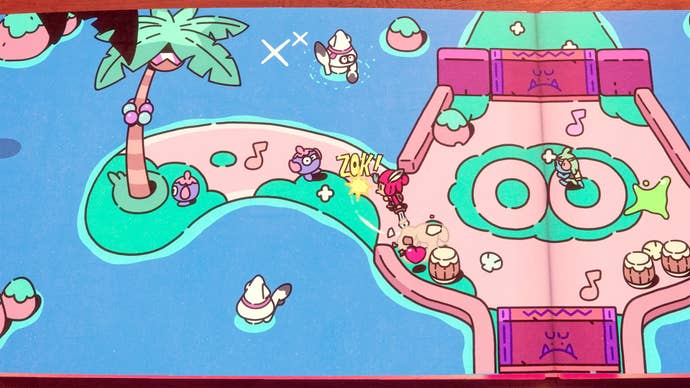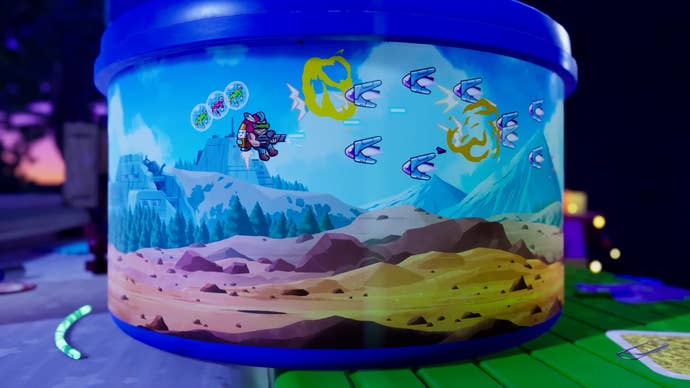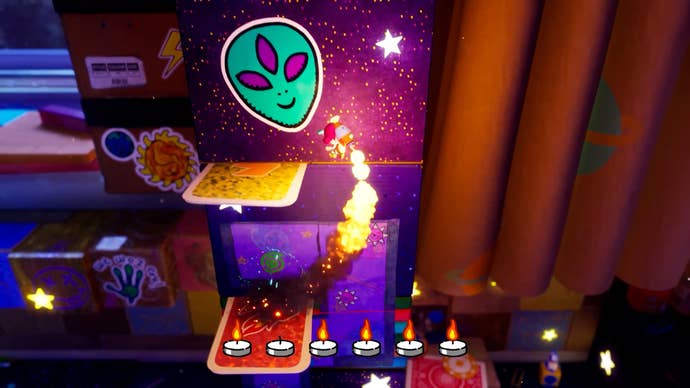Products You May Like
I don’t regret any of the nine hours I’ve spent with The Plucky Squire, but one of my most anticipated indie games of the year turned out to be a bit of a slog… again.
It’s a rather frustrating outcome after a September full of pretty banging AAA releases and a handful of well-marketed and good-looking indie titles which ultimately disappointed me (with Wild Bastards and Caravan SandWitch being the most notable cases). I might be in the minority once again, however, so this is me trying to examine why and how this little big adventure fell short of my expectations.
With the underlying tech and killer visual presentation all figured out, The Plucky Squire seemed like an easy win. It’s paying homage to classic The Legend of Zelda games and 3D platformers, with a nice touch of fresher ideas that feel lifted straight from Little Big Planet. For the most part, the story successfully captures that sort of naive, uncomplicated energy with a tale that never veers too hard into weird territory in spite of its meta elements; it’s a game I’d heartily recommend to most people looking to play something small, especially the youngest gamers.
The fact All Possible Futures actually nailed both the audiovisual elements – which coalesce into a genuinely gorgeous game – and the traditional-but-not-quite plot only made the ‘game’ side of things more difficult to understand. Its gimmicks, which generally allow the brave main character to leap out of a book’s pages and interact with the story as an out-of-bounds god of sorts, just work and are put to good use…as long as you’re fine with walking the path laid in front of you. For a game that spends so much time talking about rewriting stories and quite literally thinking outside the box, it’s a remarkably constrained experience.
Narratively, there’s more happening in this game than meets the eye. There are some genuinely solid character arcs and beats in here, and its themes are crystal-clear, but presented in earnest fashion versus the cheap subversion many artists would’ve gone for given the loopy basic premise. But those bold swings don’t translate into the game itself beyond each new ability’s introduction and the minigames, which are absolute highlights and made wonder if The Plucky Squire would’ve been better off as a smaller and more straight-up homage-ish game, a sort of indie Astro Bot not tied to a single brand.
For example, the promise early on of the titular Plucky Squire’s ability to leave the book and interact with the world inside its pages in unique ways teases a free-flow adventure that encourages creative thinking more in line with that of an immersive sim, despite the overarching action-adventure/platforming structure. Of course, such an overall design would’ve introduced a significant number of development challenges that perhaps All Possible Futures would’ve struggled with. But that’s sort of the implicit promise at the very centre of the story and mechanics being introduced after the game’s opening minutes.

Instead, the progression through the levels’ many enemy encounters, mazes, and puzzles only allows one possible solution at all times, and that solution usually has neon signs pointing to it (not literally, but almost). If you thought companion characters spewing out solutions to puzzles after 10 seconds of doing nothing in AAA games was counter-productive, you’ll probably hate the little wizard present in almost every page to give you the least tip-like tips I’ve ever seen in a video game. The Plucky Squire not only keeps things overly simple, going against its central premise, but also actively wants you to stick to the script, which is the opposite of what the story wants to tell anyone that makes it to the credits.
Sure, The Plucky Squire has to work with kids as well, but let’s not kid ourselves: the vast majority of people that are enticed by these sorts of nostalgia-inducing romps at this point are adults who haven’t murdered their inner child yet. And, even if you have a child playing this, chances are he’d manage just fine without overdone guardrails. I mean, they’re raking in Fortnite BR wins like it’s nothing. There’s no need to dumb things down too much, I reckon.

Since the devs seemingly were so unconsciously uncomfortable with making Zelda-ish sections (the actual bulk of the game) that weren’t reduced to basic arenas, puzzles with more than three steps, or chore-filled hubs, it’s actually the 3D sections that have more joy to them. The controls never feel precise enough, but the Plucky Squire’s short real-world jaunts are easier to enjoy because that’s when the game feels noticeably more confident. F**k those insta-fail stealth sections though. Please don’t do that.
And yet, there’s plenty of joy and memorable antics to be found in The Plucky Squire: its minigames (mostly attached to boss fights) are a nice change of pace, and the writing is thoroughly tight and funny without overdoing it. In fact, I’d say the journey picks up quite a bit during the second half despite the aforementioned issues.
All Possible Futures’ introductory game may not be fully formed as a dimension-bending adventure that makes the most of the systems, mechanics, and literal text it’s built on, but count me in for a return to the land of Mojo with lessons learned.
